Jamal Mamo discovered that an attempted military coup was playing out just beyond his Istanbul apartment last summer from his brother-in-law in Saudi Arabia.
Mamo’s building in a working-class suburb was too far from the initial clashes erupting that warm July night for him to hear the first gunshots in the streets or the fighter jets dogfighting overhead. But it wasn’t long after his wife’s brother messaged to say he saw news reports about a coup, that the action had reached Mamo’s street. “Allahu akbar!” the local muezzin cried over the mosque’s loudspeakers, drawing crowds of people into the street.
Overcome with a familiar anxiety, Mamo, a short and stocky Syrian who had moved to Turkey three years earlier to escape his own country’s collapse, climbed up his building’s steps to his cousin’s apartment, where the two men spent the rest of the night monitoring the news. “We were afraid,” Mamo said. “Not afraid of guns and shooting because, as a Syrian, I got used to this. Actually, we were afraid because at that time—and still I feel this—Turkey is the last hope that we can rely on. There is nothing for us after here.”
Recent political turmoil in Turkey has renewed a sense of insecurity for nearly 3 million Syrians sheltering there from their own country’s civil war. Many, like Mamo, have been monitoring the instability with a dark sense of déjà vu.
The English teacher and opposition activist from the sprawling Syrian city of Aleppo watched fighting spread through his own country five years ago with a sense of invincibility until it literally crashed through his walls. “I was looking at what was happening in Syria in the way that someone watches news on the TV. ‘It is not going to affect me,’” he said.
His optimism endured, even as fighting broke out close enough to his home that he sent his wife Layla al-Abbas and four-year-old daughter Sana to his in-laws’ home in neighboring Lebanon. “At that time I didn’t expect that my worst fears, my worst nightmare would happen. I thought, okay, the international community would intervene and do something,” he said. It wasn’t until a mortar crashed into the top floors of his building one day while he was watching television that his optimism was finally shattered.
More than a ton of stones and rubble crashed down into his garden and into his home. Covered in debris, Mamo went into the bathroom to change his clothes and noticed he was bleeding from his stomach. The shrapnel injury was minor but the sight of blood on his body and rubble in his home deeply affected him. “It hit my whole existence,” he said. “It made me discover suddenly that it’s not TV. What’s happening is reality. That was the first time that I came out of the mood of somebody who is watching and came into the mood of someone who is touching the blood, the rubble, smelling dynamite. I fled away the next day.”
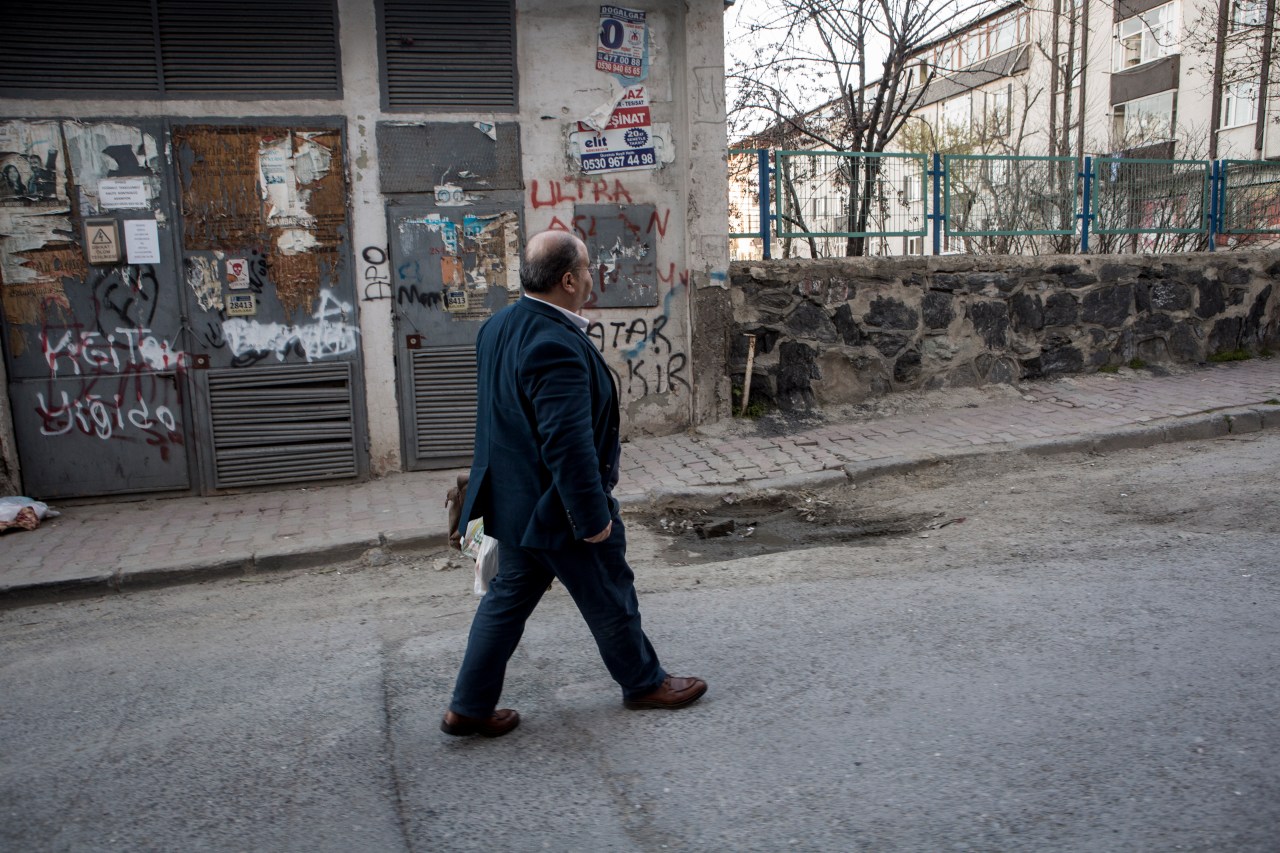
Where to go, though, wasn’t clear. Mamo and his wife held out hope that normalcy would eventually return to Aleppo. Before the war, he had been working as an English teacher to pay the bills, while feeding his passion for writing as an occasional contributor to newspapers and magazines. His wife worked at a telecommunications company and had been visiting doctors to find out why she was having trouble conceiving a little brother or sister for Sana—a worry they shared that suddenly seemed trivial in the face of more daunting problems: where to go, how to support themselves.
After months of hustling in Lebanon and Syria, Mamo received a call one day from someone working for Syria’s opposition based in Istanbul, with a job offer. Mamo accepted so hastily that he hadn’t arranged for a place to live when he reported for his first day of work. “I asked him if it was possible for me to sleep in the office and he said, okay,” Mamo said. But two months later the gig was over. The man who offered him the position jumped at his own opportunity to move to the United States, leaving Mamo in a precarious situation. “He said: ‘Goodbye, the job is over, you have to depend on yourself,’” Mamo recalled with a laugh. “My journey in Istanbul started at this time.”
Mamo’s cousin, who would later sit with him through the night of Turkey’s attempted coup, tipped him off that an apartment in his building was about to become available. With savings and help from friends, he managed to put a deposit down on the simple white-tiled two-bedroom overlooking the building’s courtyard—his first real home since he fled Aleppo nearly a year before.
Though his wife and daughter joined him there in October 2013, a couple months after he first arrived in Istanbul, the Mamos did not see life in Turkey as a permanent solution. The family was primarily deterred from making long-term plans because of the “temporary protection” Turkey had been offering displaced Syrians.
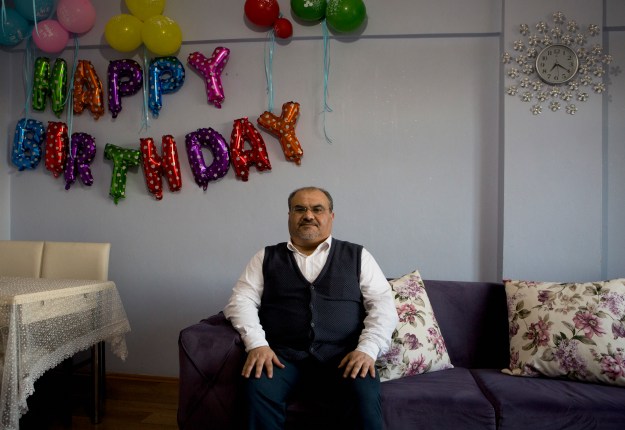
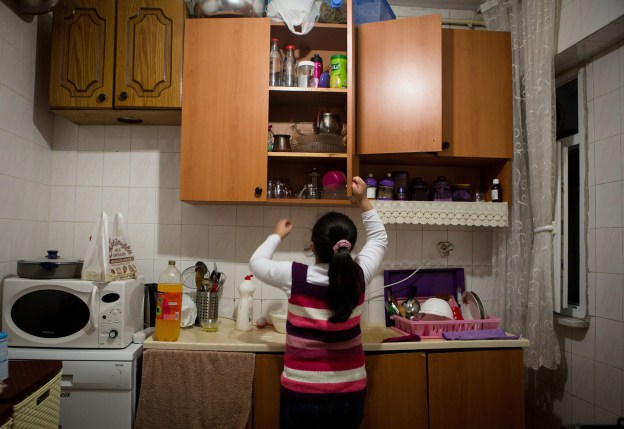
Turkey has accepted more displaced Syrians than any other country in the world—nearly 3 million people, according to the United Nations High Commission for Refugees. The Turkish government has been leading the effort to house and protect its “guests,” as they are known, at more than two dozen refugee camps around the country. Nearly 90 percent of Syrians in Turkey, though, choose, like the Mamos, to go it alone, renting their own apartments with whatever money they manage to scrape together. Though those who choose to support themselves are still eligible for “temporary protection,” which includes free medical care and residency, they are not offered the same protections and rights (like full access to the labor market and financial aid) most Western countries provide to approved refugees.
Looking for a more permanent solution, Mamo applied with the United Nations to be recognized as a refugee and resettled somewhere else—hopefully an English-speaking country where his family could more easily integrate—but the months passed without a word. “Nothing happened. They didn’t call me. I went three times [to the U.N. office] and one time they didn’t even allow me to go inside,” he said. “They are treating Syrians very bad. So I lost any hope in the UNHCR that they might resettle me and my family.” Unwilling to migrate illegally, Mamo and his family were stuck.
Despite their initial reservations about Turkey, little by little, Mamo and his family began to settle in. He enrolled Sana at a Canadian-Syrian school where she began to make friends and improve her English. Mamo found sporadic work, sometimes writing, sometimes translating. And unexpectedly they welcomed a baby boy. Taim was born in March 2015, further chipping away the family’s resistance to staying in Turkey. “I decided, if I am given permanent residence or Turkish nationality or if I find a [permanent] job, I will stay,” Mamo said.
But just as they began to let go of their resistance, Turkey’s own political situation began to deteriorate. Fallout from the war in Syria spilled over the border into Turkey rekindling a dormant civil war in the country’s southeast and sparking a string of terrorist attacks across the country—suicide bombings, car bombings, assassinations. “I was very angry,” Mamo said. “I didn’t want these terrorist attacks to happen here because it would be associated with Syrians and we had enough. We had enough.”
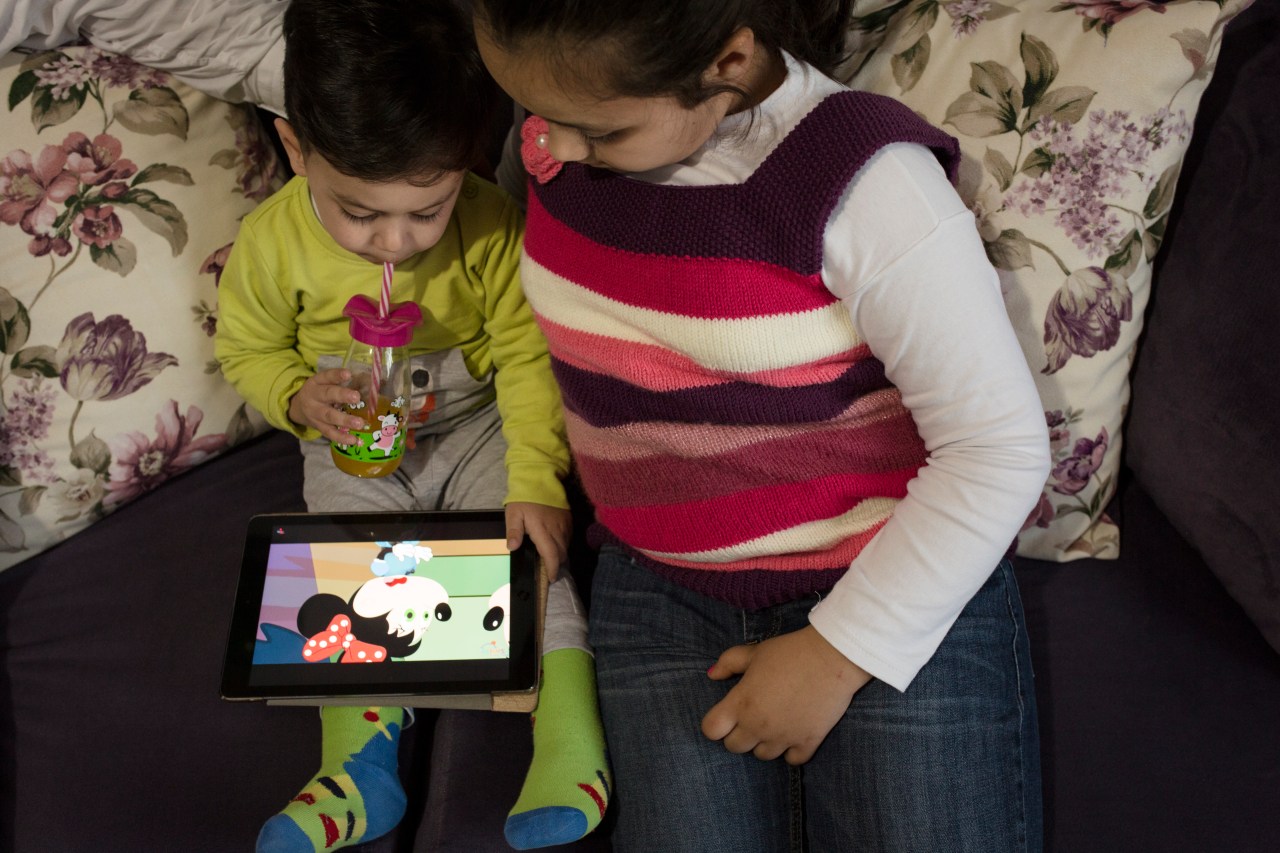
Besides eroding the sense of physical security Turkey had been providing so many Syrians, the violence also began to undermine hospitality and tolerance toward them. Even before terrorist attacks became a normal occurrence, surveys found that the majority of Turks were worried about the massive influx of Syrians to their country. Syrians now say they feel even more tension, which they associate with the Turks’ anger over the regional effects of Syria’s war and bitterness over whatever financial benefits Syrians in Turkey might be receiving—however meager—as Turkey struggles through its own economic problems.
Mamo detected this worn-out welcome in denied banking transactions, in the looks he sometimes got in public, in the humiliation of having to stand outside in the rain, along with dozens of other Syrians waiting to have their Turkish residence card renewed. “When I told the security people that it is not good treatment, they shouted at me and they kicked me out of the whole place and they treated other Syrians the same way,” he said. “I had to go three times and I had to wait for long hours [before the card was renewed]. I complained about that but nobody cared.”
The night of the military coup he found himself desperately hoping that the situation in Turkey wouldn’t get worse. “If a military coup had succeeded [Syrians] would have been thrown away,” he worried. “We felt very insecure. I was afraid of—where should we go after that? What is the next thing?”
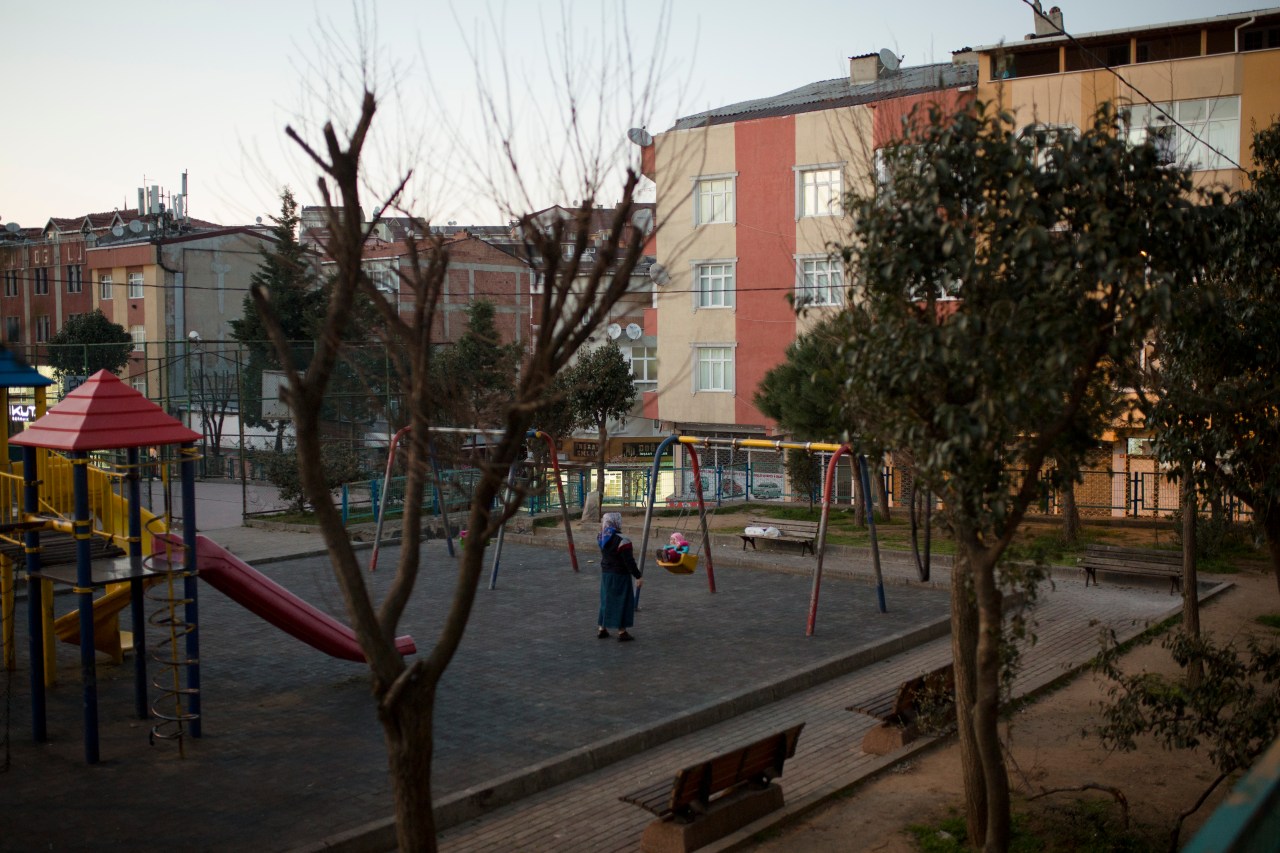
As the sun rose the following morning, the sounds of jets roaring across the sky had quieted and news anchors were reporting the coup had failed. Sana asked her father what was going on and he replied that some people were against the president but that they lost. “She didn’t question anything after that,” he said.
Though he was relieved with the outcome of the night, he braced himself for the fallout. In response to the brazen threat it faced, the Turkish government initiated an unprecedented crackdown, arresting thousands of people—many without charge—under an ongoing state of emergency. The mood darkened, tourists fled, the economy suffered and Mamo watched warily as friend after friend lost their jobs.
“We’re feeling unsafe because once you lose your job, you are unable to pay the rent, and once you are unable to pay the rent you are kicked to the streets,” he said.
So far, Mamo has been spared. After a bout of unemployment, he found work as a translator for the Syrian National Coalition. Though he remains worried about the situation in Turkey, he has found brightness to focus on too, like a Facebook message he recently received from a Turkish woman whose father was looking to support Syrian charities in Turkey.
“This was amazing because, after six years of the Syrian crisis and its impact on Turkey, you can still find many people who express their sympathy and desire to help,” he said.
Mamo also came around to the understanding that he has few other options but to stay in Turkey and make his family’s life and future there as comfortable as he can. His wife has started learning Turkish and they plan to enroll Sana in a Turkish school soon. Meanwhile, Mamo is looking for a better apartment. “The kitchen is really bad, the bathroom is really bad and the owner refuses to make any repairs,” he recently complained. “We have been living here for three years and a half,” he said. “It’s time.”